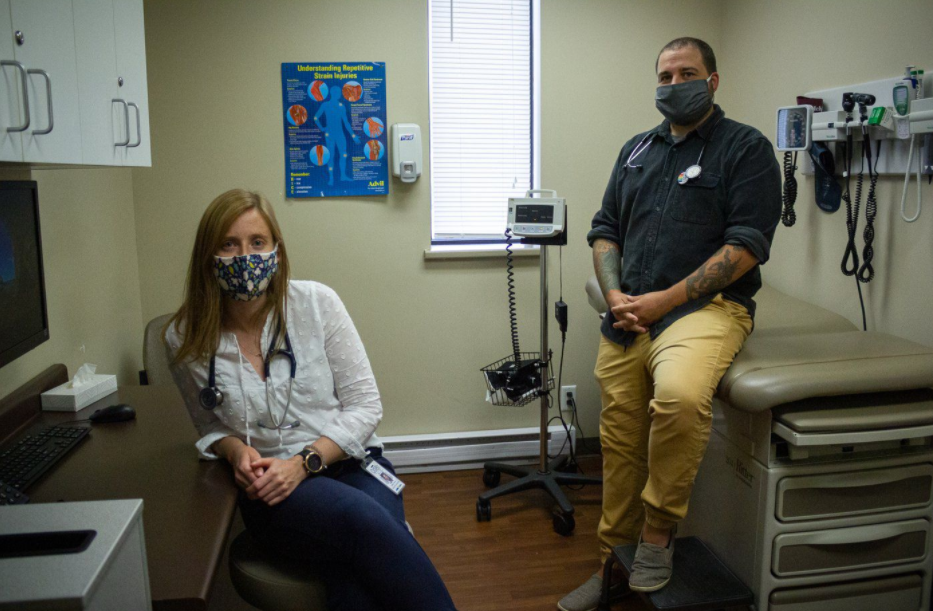Before there was PrEP, those at risk of contracting HIV had to venture to an immunology clinic in Hamilton.
Now, thanks to a program recently started this past summer at the Quest Community Health Centre, Niagarans can access the resources they need from their own backyard.
PrEP stands for pre-exposure prophylaxis. Produced by Gilead and approved by the Food and Drug Administration for use in the United States in 2004 and by Health Canada in 2016, it’s a combination of two “antiretroviral” drugs — emtricitabine and tenofovir — which can prevent HIV from becoming a permanent infection after an exposure.
When introduced into the body, HIV makes itself at home in white blood cells, which play an important role in the immune system (they’re known as CD4 cells — named for the glycoprotein found on the cell’s surface).
As invaded CD4 cells replicate, they consequently make copies of the HIV. The population of the virus grows, taking over more and more CD4 cells until the body’s immune system is so weakened, it can’t get on top of the HIV — the virus then becomes permanent.
PrEP essentially prevents HIV from making copies of itself within CD4 cells. It’s that helping hand which gives the body’s immune system a chance to do its thing — wiping HIV from the body and preventing a permanent infection.
With the availability of generic (non-name brand) forms of PrEP in recent years, the monthly cost of the drug has decreased to between $250 and 280, down from over $1,000 per month in prior years.
“It’s quite difficult to access PrEP in Niagara; it’s quite difficult to access HIV treatment in Niagara,” Emily Kedwell said.
She’s a nurse practitioner at Quest, and the lead for of an interdisciplinary medical and allied health team.
Kedwell has heard that upwards of 50 Niagarans were having to seek out PrEP in Hamilton — a significant barrier to access for those without time, transportation or money.
Steven Athanasas, a registered nurse at Quest, is behind making PrEP available within the Niagara Region, as part of a larger initiative in the clinic’s pursuit to gain recognition as a “best practise spotlight organization” with the Registered Nurses Association of Ontario.
“It’s important for me to help out the community,” said Athanasas, who identifies as a member of the LGBTQ+ community. “I do have some friends who were diagnosed with HIV, so I know it’s important.”
One of the reasons Athanasas was drawn to Quest is their focus on the community, and ridding barriers to care.
“The LGBTQ+ community, they deal with a lot of resistance to getting proper health care,” Athanasas said.
He even opened an account under Quest’s name on Grindr — a smartphone-based social networking app for gay, bi, trans and queer people — to get the word out about PrEP.
“Right now, in the community I think there are still a lot of people who don’t even know what it is,” he said.
PrEP is purported on Quest’s website, to be most effective for those at risk of contracting HIV through sexual contact, touting a potential reduction in risk of infection from unprotected sex by up to 99 per cent — and up to a 75 per cent reduction in risk of infection resulting from injection drug use.
“With daily adherence, it can be highly, highly effective,” Kedwell said.
People on the medication do require monitoring every three months before being given their next prescription, and before starting on PrEP, will need to get blood work taken and possibly swabs.
“We have to ensure somebody does not have HIV prior to starting the medication and there’s also some monitoring parameters and guidelines around liver function and kidney function and ensuring that the medication isn’t having any detrimental effects on anyone,” Kedwell explained. “If we end up getting a result and somebody is HIV positive, you have to stop the medication, which we have to do quite quickly,” she added.
Anyone wanting to inquire about PrEP can call Quest, where an appointment will be made with Athanasas for an assessment. Most are being done virtually.
“There’s no judgment whatsoever; you could be super promiscuous, you could be sleeping with two people, you could have a steady partner who may be HIV-positive — it doesn’t matter to me. I’m here to help them out, I’m here to listen and do what’s right for them,” he said.
While Niagara infection rates are low — Niagara Region Public Health stats show less than five cases of HIV in 2020 — the region is located close to Hamilton and Toronto, areas with some of the highest HIV numbers in Ontario when compared with other provincial public health units (from 2013-2017).
Asked what he hopes will come from Quest’s program, Athanasas said, “I hope a lot of people use it. I hope we play some small part in preventing HIV for the community. I hope it just makes for easier access.”
Having begun this past summer, the program presently has seven clients using PrEP.
Quest is also working on getting a PEP (post-exposure prophylaxis) program ready for roll out this winter.
- Jordan Snobelen, Local Journalism Initiative, North Bay Nugget



